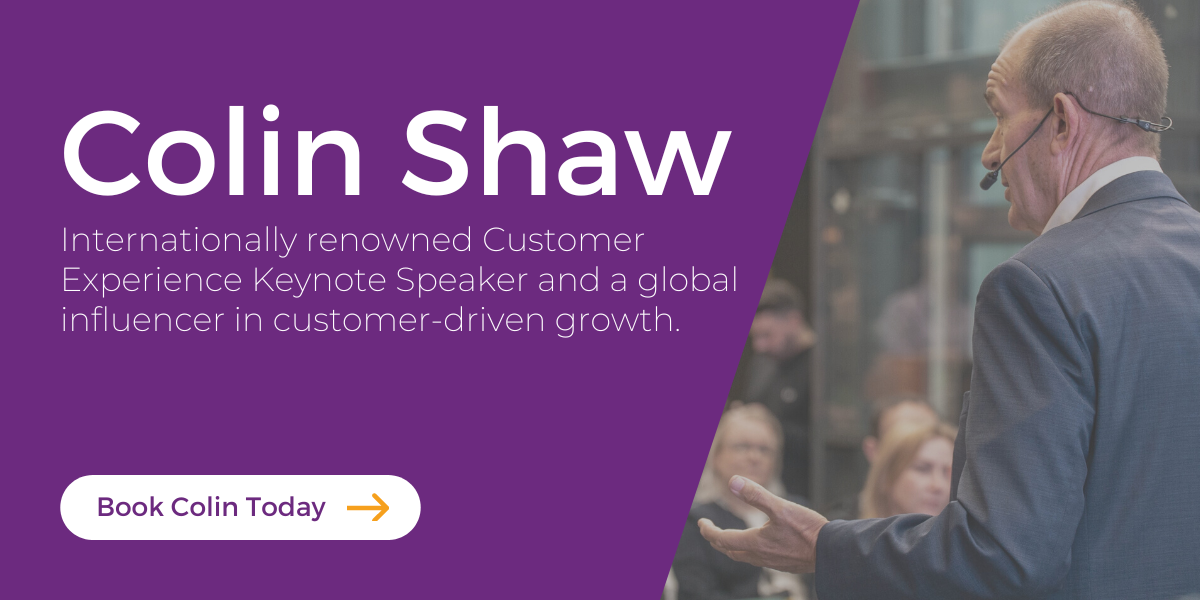Emotional intelligence (EQ) is critical to leadership. EQ is also a crucial part of your customer experience design and delivery. Today, we are discussing EQ, what it is, and how it helps your customer strategy and leadership.
Some of the best leaders have a higher EQ than IQ. Daniel Goleman’s work regarding Emotional Intelligence (EQ) has been an essential part of the leadership conversation since he published it years ago.
The same goes for customer service representatives. Having a high EQ is vital to customer service. In particular, the EQ of an individual is a crucial indicator of their success when it comes to the emotional management of customers.
Watch Colin talking about this on YouTube:
Subscribe to our YouTube channel here to see all the latest videos!
So, what is EQ? An oversimplified summary of EQ is how well you get on with people. The complete answer is what follows.
There are five realms of emotional intelligence that we will explore today. So, let’s start with the first one about knowing your emotions.
EQ Realm #1: Know your emotions.

Knowing your emotions is effectively knowing how you feel, from stressed to annoyed to happy. So, it’s knowing how you feel as an individual. One of the things I’ve become good at is understanding myself.
If you want to lead people, the first thing you have to do is understand yourself. I knew I didn’t understand myself when I first heard that, so I figured out why.
Many years ago, I participated in a 360-degree feedback event, where your team and others filled out a questionnaire about you and participated in various events. Then, in the end, you get your results from your peers, your team, and everyone else.
One of the most exciting things about this experience was that I didn’t recognize the person they described. I didn’t think I was like that. Some things were better than I thought, and some were worse.
For example, I learned that things I was saying and doing impacted people in ways I hadn’t intended. For example, my British sense of humor is to tease my colleagues. We say things we don’t mean to get a rise from each other. However, you can’t do that with everybody. Especially when you first meet someone, you can’t act like this immediately. They might get the wrong idea or not realize you are joking. That was something that occurred in my 360-evaluation exercise.
People feel things but don’t necessarily stop and think, “What am I feeling, and why am I feeling it?” For example, in my current weight loss program, I learned that I ate often, but it wasn’t because I was hungry. Instead, I ate because of emotional triggers. These emotional triggers could be happy, which leads to celebration eating, or sad, which leads to comfort food. When I learned I was using food to satisfy emotional needs, I could reframe my eating and lose weight. This example leads nicely into the next EQ Realm, which is….
EQ Realm #2: Managing Your Emotions.
So, the first step is to understand what you think and feel, from the obvious ones, like rage or joy, which are evident, to the more subtle feelings, like envy or boredom. Then, once you know what you feel, you can manage your emotions to a better state (or, if it is joy, or something just as great, ride it out to its natural conclusion).
For example, if I was frustrated with my team, I learned I would have to hide that, or it could have poor consequences for my desired outcome. In other words, negatively portraying frustration could demotivate the team from making the necessary changes I needed them to make.
Some people are born with more emotional intelligence than others. When I was running the call center at British Telecom, we decided to reorganize the customer service department into the front office, i.e., dealing directly with customers, and the back office, i.e., dealing with the administrative tasks associated with customer service teams. We let people choose where they went.
Afterward, through psychometric testing from an outside company, we discovered that as many as 50 percent of the people were working on the wrong side of the front/back-office split. Furthermore, that discovery led to me realizing that I had 50 percent of the wrong people dealing with customers before this split.
However, you can improve your emotional intelligence. By starting with the first two realms, you can learn to understand your emotions and then how to manage them to a better conclusion. Or, at least, know your strengths and areas of opportunity, so you pick the right team in your version of the front/back office division.
EQ Realm #3: Motivating yourself.
So, this bit is about how good you are at getting yourself to learn new skills. Will you get depressed and blame everybody else for your situation, or will you work on making significant changes to improve? In other words, how well do you deal with change?
Our recent podcast about the good news associated with a recession touches on this topic, too. There are ways of looking at change, which might feel like a bad thing, as a good thing. So, there is the possibility of losing one’s job in a company reorganization inspired by the recession. However, the labor market is still tight, so there could be an opportunity somewhere else, and it might be a better job. It also could be an opportunity to demonstrate to the company why they shouldn’t eliminate your position.
I have a friend that is way smarter than I am. However, I am more successful than him. How did I pull this off? I am more successful because I work harder than he does. If my friend leveraged his intellect and demonstrated my work ethic, I am convinced he would be far more successful than me. It’s a question of motivation, not ability in his case—and mine.
Realm #4: Recognizing and understanding other people’s emotions.
To a certain extent, this realm is about empathy. Understanding how others feel is essential to emotional intelligence. For example, employees recognizing when a customer is upset is integral to delivering an excellent customer experience.
Empathy is easier when you know the person well. For example, I can tell by a one-word response from my wife Lorraine how she feels. It’s a bit trickier when the person is a stranger.
People with high emotional intelligence can recognize other people’s emotions. However, many employees need some training on it.
Years ago, one of my team members was three days away from her wedding but still at work. However, she was under a lot of stress, and I could tell. So, I told her to start her leave early, without taking it officially, and then come back ready to tackle all the projects awaiting her upon her return.
Talk about creating loyalty! She did exactly that, and it was a win-win for everyone. I wonder what would have happened to our relationship if I hadn’t noticed what was happening to her emotionally at that critical life milestone.
EQ Realm #5: Managing Relationships
Our recent podcast on customer engagement touches on this topic, too. Customer engagement measures your ability to build and maintain emotional relationships with customers. It is also an essential EQ skill to manage relationships with other people.

You must take a long-term view of your customer relationship, not a short-term one. Building relationships is how you get customers to keep giving you their money. Otherwise, they might build a relationship with your competitor and give all their money to them.
Many organizations labor under the idea that building relationships is about giving customers everything they want. However, if you reflect on your family and friends, those relationships are not about giving them everything they want. Giving in these relationships is a two-way street and involves compromise.
So, the key takeaways for leadership regarding EQ are that having a high degree of emotional intelligence is essential. If you don’t have it naturally, develop it. It is critical to recognize that it’s okay to talk about emotions and acknowledge the feelings in others and yourself and manage them. The more you become self-aware, the more you realize the impact that you have on others and others can have on you.
Not only does this awareness improve your relationships and your leadership, but if you manage it correctly, it improves the Customer Experience. I’ve used that knowledge of how I and others feel in designing customer experiences.
I don’t think you can help but become more empathetic and better at managing relationships if you improve your understanding of emotions. The most accessible place to start is determining what’s going on with you when you have experiences with an organization.
For example, if an email annoys you from a company, ask yourself why. If a company does something you like, figure out what about the experience makes you feel that way. Then, once you identify these things, you might be able to apply some of them to improve your experience.
Emotional Intelligence is an essential component of leadership, whether you are leading a team or a customer through your experience. By developing your skills, starting with your emotional management, you can fix a bad experience or provide experiences that surprise and delight customers, build relationships, and get them to give their money to you instead of your competitor.
Colin has spoken at hundreds of conferences, including some of the world’s largest brands. Talk to Colin about how he can speak ‘in person’ or ‘virtually’ at your conference. Click here.





